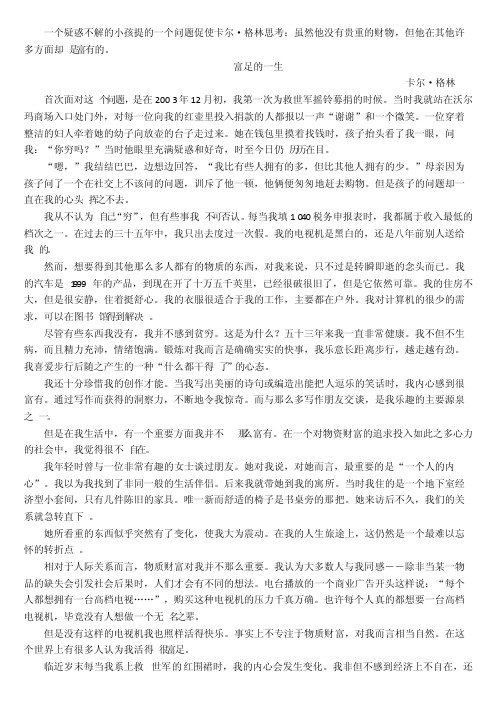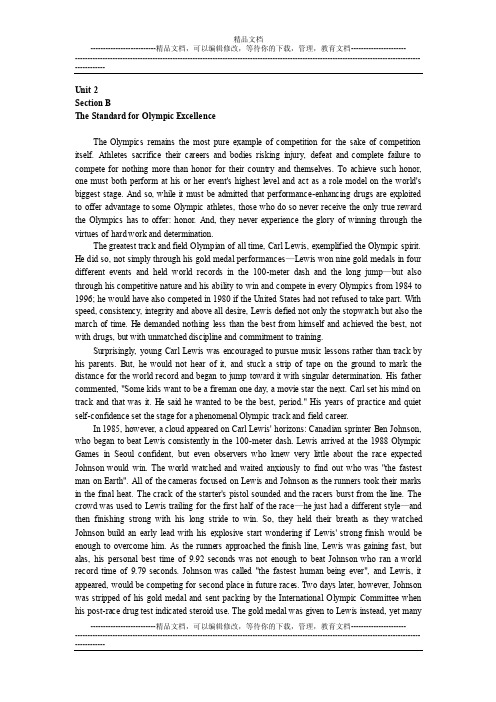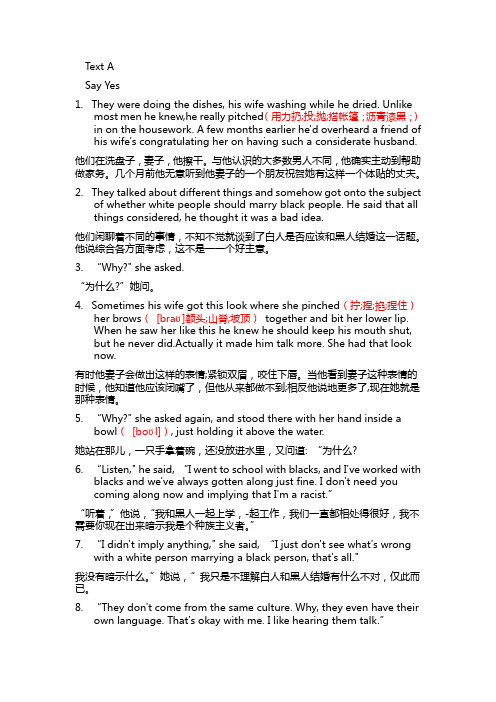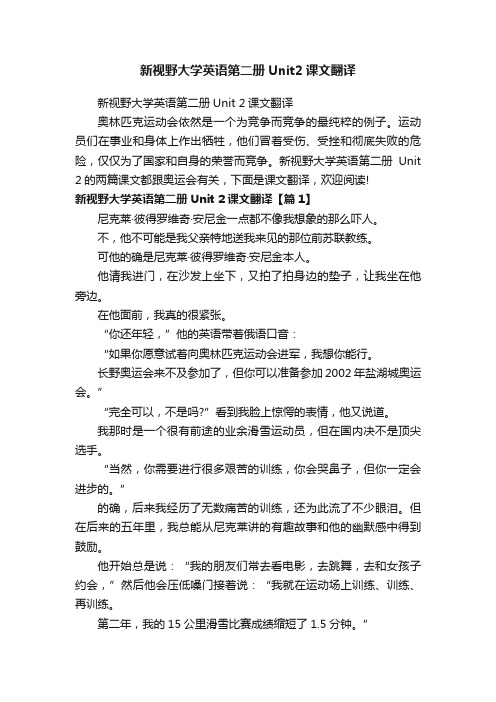大学英语第二册第二单元翻译
- 格式:ppt
- 大小:489.00 KB
- 文档页数:8

一个疑惑不解的小孩提的一个问题促使卡尔·格林思考:虽然他没有贵重的财物,但他在其他许多方面却是富有的。
富足的一生卡尔·格林首次面对这个问题,是在2003年12月初,我第一次为救世军摇铃募捐的时候。
当时我就站在沃尔玛商场入口处门外,对每一位向我的红壶里投入捐款的人都报以一声“谢谢”和一个微笑。
一位穿着整洁的妇人牵着她的幼子向放壶的台子走过来。
她在钱包里摸着找钱时,孩子抬头看了我一眼,问我:“你穷吗?”当时他眼里充满疑惑和好奇,时至今日仍历历在目。
“嗯,”我结结巴巴,边想边回答,“我比有些人拥有的多,但比其他人拥有的少。
”母亲因为孩子问了一个在社交上不该问的问题,训斥了他一顿,他俩便匆匆地赶去购物。
但是孩子的问题却一直在我的心头挥之不去。
我从不认为自己“穷”,但有些事我不可否认。
每当我填1040税务申报表时,我都属于收入最低的档次之一。
在过去的三十五年中,我只出去度过一次假。
我的电视机是黑白的,还是八年前别人送给我的。
然而,想要得到其他那么多人都有的物质的东西,对我来说,只不过是转瞬即逝的念头而已。
我的汽车是1999年的产品,到现在开了十万五千英里,已经很破很旧了,但是它依然可靠。
我的住房不大,但是很安静,住着挺舒心。
我的衣服很适合于我的工作,主要都在户外。
我对计算机的很少的需求,可以在图书馆得到解决。
尽管有些东西我没有,我并不感到贫穷。
这是为什么?五十三年来我一直非常健康。
我不但不生病,而且精力充沛,情绪饱满。
锻炼对我而言是确确实实的快事,我乐意长距离步行,越走越有劲。
我喜爱步行后随之产生的一种“什么都干得了”的心态。
我还十分珍惜我的创作才能。
当我写出美丽的诗句或编造出能把人逗乐的笑话时,我内心感到很富有。

Unit 2Section BThe Standard for Olympic ExcellenceThe Olympics remains the most pure example of competition for the sake of competition itself. Athletes sacrifice their careers and bodies risking injury, defeat and complete failure to compete for nothing more than honor for their country and themselves. To achieve such honor, one must both perform at his or her event's highest level and act as a role model on the world's biggest stage. And so, while it must be admitted that performance-enhancing drugs are exploited to offer advantage to some Olympic athletes, those who do so never receive the only true reward the Olympics has to offer: honor. And, they never experience the glory of winning through the virtues of hard work and determination.The greatest track and field Olympian of all time, Carl Lewis, exemplified the Olympic spirit. He did so, not simply through his gold medal performances—Lewis won nine gold medals in four different events and held world records in the 100-meter dash and the long jump—but also through his competitive nature and his ability to win and compete in every Olympics from 1984 to 1996; he would have also competed in 1980 if the United States had not refused to take part. With speed, consistency, integrity and above all desire, Lewis defied not only the stopwatch but also the march of time. He demanded nothing less than the best from himself and achieved the best, not with drugs, but with unmatched discipline and commitment to training.Surprisingly, young Carl Lewis was encouraged to pursue music lessons rather than track by his parents. But, he would not hear of it, and stuck a strip of tape on the ground to mark the distance for the world record and began to jump toward it with singular determination. His father commented, "Some kids want to be a fireman one day, a movie star the next. Carl set his mind on track and that was it. He said he wanted to be the best, period." His years of practice and quiet self-confidence set the stage for a phenomenal Olympic track and field career.In 1985, however, a cloud appeared on Carl Lewis' horizons: Canadian sprinter Ben Johnson, who began to beat Lewis consistently in the 100-meter dash. Lewis arrived at the 1988 Olympic Games in Seoul confident, but even observers who knew very little about the race expected Johnson would win. The world watched and waited anxiously to find out who was "the fastest man on Earth". All of the cameras focused on Lewis and Johnson as the runners took their marks in the final heat. The crack of the starter's pistol sounded and the racers burst from the line. The crowd was used to Lewis trailing for the first half of the race—he just had a different style—and then finishing strong with his long stride to win. So, they held their breath as they watched Johnson build an early lead with his explosive start wondering if Lewis' strong finish would be enough to overcome him. As the runners approached the finish line, Lewis was gaining fast, but alas, his personal best time of 9.92 seconds was not enough to beat Johnson who ran a world record time of 9.79 seconds. Johnson was called "the fastest human being ever", and Lewis, it appeared, would be competing for second place in future races. Two days later, however, Johnson was stripped of his gold medal and sent packing by the International Olympic Committee when his post-race drug test indicated steroid use. The gold medal was given to Lewis instead, yet many --------------------------精品文档,可以编辑修改,等待你的下载,管理,教育文档----------------------------------------------------------------------------------------------------------------------------------------------------------------did not see his conquest as a real victory, and he became swept up in the apparent blanket condemnation of the sport. Worse, a former opponent charged Lewis with steroid use. Lewis firmly denied the charges and countered by proving before a judge that the magazine that had published the stories did so without foundation to their claims. He also participated in drug test after drug test to prove he was clean. An opponent of steroid use, Lewis was never linked to drug use by anything but rumor.It would take the formula of Lewis' further commitment to the sport and his love for competition to lift some of the suspicion from track events and stop the erosion of support that the Olympics began to suffer after Seoul. With his continued hard work and honest participation in sprinting and the long jump, he proved to the world that the Olympic spirit was not dead. And in 1992, Lewis competed in his third Olympics winning two more gold medals in the long jump and 4×100 meter relay with a reception from the public that was fit for a king.The amazing Carl Lewis had demonstrated that he was unlike any athlete who had ever lived, not by simply winning, but by winning honestly, loving to compete and working the hardest for the longest time. His love for the games truly set a new standard for Olympic excellence. (Words: 835)--------------------------精品文档,可以编辑修改,等待你的下载,管理,教育文档----------------------------------------------------------------------------------------------------------------------------------------------------------------。

新视野⼤学英语第⼆版第⼆册课⽂翻译Unit2-SectionAUnit 2Section ALearning the Olympic Standard for LoveNikolai Petrovich Anikin was not half as intimidating as I had imagined he would be. No, this surely was not the ex-Soviet coach my father had shipped me out to meet.But Nikolai he was, Petrovich and all. He invited me inside and sat down on the couch, patting the blanket next to him to get me to sit next to him. I was so nervous in his presence."You are young," he began in his Russian-style English. "If you like to try for Olympic Games, I guess you will be able to do this. Nagano Olympics too soon for you, but for 2002 in Salt Lake City, you could be ready.""Yes, why not?" he replied to the shocked look on my face. I was a promising amateur skier, but by no means the top skier in the country. "Of course, there will be many hard training sessions, and you will cry, but you will improve."To be sure, there were countless training sessions full of pain and more than a few tears, but in the five years that followed I could always count on being encouraged by Nikolai's amusing stories and sense of humor."My friends, they go in the movies, they go in the dance, they go out with girls," he would start. "But I," he would continue, lowering his voice, "I am practice, practice, practice in the stadium. And by the next year, I had cut 1-1/2 minutes off my time in the 15-kilometer race!"My friends asked me, 'Nikolai, how did you do it?' And I replied, 'You go in the movies, you go in the dance, you go out with girls, but I am practice, practice, practice.'"Here the story usually ended, but on one occasion, which we later learned was his 25th wedding anniversary, he stood proudly in a worn woolen sweater and smiled and whispered, "And I tell you, I am 26 years old before I ever kiss a girl! She was the woman I later marry."Romantic and otherwise, Nikolai knew love. His consistent good humor, quiet gratitude, perceptivity, and sincerity set an Olympic standard for love that I continue to reach for, even though my skiing days are over.Still, he never babied me. One February day I had a massive headache and felt quite fatigued.I came upon him in a clearing, and after approximately 15 minutes of striding into the cold breeze over the white powder to catch him, I fussed, "Oh, Nikolai, I feel like I am going to die.""When you are a hundred years old, everybody dies," he said, indifferent to my pain. "But now," he continued firmly. "Now must be ski, ski, ski."And, on skis, I did what he said. On other matters, though, I was rebellious. Once, he packed 10 of us into a Finnish bachelor's tiny home for a low-budget ski camp. We awoke the first morning to find Nikolai making breakfast and then made quick work with our spoons while sitting on makeshift chairs around a tiny card table. When we were finished, Nikolai stacked the sticky bowls in front of my sole female teammate and me, asserting, "Now, girls do dishes!"I threw my napkin on the floor and swore at him, "Ask the damn boys! This is unfair." He never asked this of me again, nor did he take much notice of my outburst. He saved his passion for skiing.When coaching, he would sing out his instructions keeping rhythm with our stride: "Yes, yes,one-two-three, one-two-three." A dear lady friend of my grandfather, after viewing a copy of a video of me training with Nikolai, asked, "Does he also teach dance?"In training, I worked without rest to correct mistakes that Nikolai pointed out and I asked after each pass if it was better. "Yes, it's OK. But the faster knee down, the better.""But is it fast enough?" I'd persist.Finally he would frown and say, "Billion times you make motion—then be perfect," reminding me in an I've-told-you-a-billion-times tone, "You must be patient."Nikolai's patience and my hard work earned me a fourth-place national ranking heading into the pre-Olympic season, but then I missed the cut for the 2002 Olympics.Last summer, I returned to visit Nikolai. He made me tea... and did the dishes! We talked while sitting on his couch. Missing the Olympic Team the previous year had made me pause and reflect on what I had gained—not the least of which was a quiet, indissoluble bond with a short man in a tropical shirt.Nikolai taught me to have the courage, heart, and discipline to persist, even if it takes a billion tries. He taught me to be thankful in advance for a century of life on earth, and to remind myself every day that despite the challenges at hand, "Now must be love, love, love." (Words: 822)。

V. Detailed Study of the Text1. concernn. 1) the feeling of worry 担心,担忧concern + for/ about/ over/ withconcern + that…There is now considerable concern for their safety. 现在对他们的安全相当担心。
There is growing concern that they may have been killed. 现在越来越担心他们已遭杀害。
2) something that makes sb. worry担心的事,忧虑的事What are your main concerns as a writer? 你身为作家,对什么最感兴趣?How much money I earn is none of your concern. 我挣多少钱与你无关。
vt. 1) make sb. worried or upset 使担心、使忧虑Our losses are beginning to concern me. 我们的损失使我担起心来。
The food crisis is starting to concern African governments. 粮食危机已开始困扰非洲政府。
2) have to do with or be relevant to 涉及,与……有关系The news concerns your brother. 这消息与你兄弟有关。
He is assembling evidence concerning a murder. 他在收集一宗谋杀案的证据。
I can’t s ay the news concerns me a great deal. 我说不上这消息与我有多大关系。
[扩展] be concerned with牵涉到,与……有关,参与The letter is chiefly concerned with export commodities. 这封信主要是关于出口商品的。

Text ASay Yes1.They were doing the dishes, his wife washing while he dried. Unlikemost men he knew,he really pitched(用力扔;投;抛;搭帐篷;沥青漆黑;)in on the housework. A few months earlier he'd overheard a friend of his wife's congratulating her on having such a considerate husband. 他们在洗盘子,妻子,他擦干。
与他认识的大多数男人不同,他确实主动到帮助做家务。
几个月前他无意听到他妻子的一个朋友祝贺她有这样一个体贴的丈夫。
2.They talked about different things and somehow got onto the subjectof whether white people should marry black people. He said that all things considered, he thought it was a bad idea.他们闲聊着不同的事情,不知不觉就谈到了白人是否应该和黑人结婚这一话题。
他说综合各方面考虑,这不是一一个好主意。
3.“Why?" she asked.“为什么?”她问。
4.Sometimes his wife got this look where she pinched(拧;捏;掐;捏住)her brows([braʊ]额头;山脊;坡顶)together and bit her lower lip.When he saw her like this he knew he should keep his mouth shut, but he never did.Actually it made him talk more. She had that look now.有时他妻子会做出这样的表情;紧锁双眉,咬住下唇。

.Unit21 我跟你说,从各方面考虑,当教师不失为一个好主意。
事实上,我认为这个主意好极了。
You know what ?All things considered,it’s not a bad idea to be a teacher. As a matter of fact,I think it is an excellent idea.2我不大喜欢你像刚才那样用讽刺的口气说话。
你好像老是在暗示,我是什么都不会的废物。
I don’t like it when you take a sarcastic tone the way you just did . You seem tobe implying all the time that I am a good-for-nothing.3我爸能让我作最后决定,真是很体谅人。
我得说我够幸运。
不是很多人都有这么好的父亲。
It is really considerate of my father to leave the final decision to me . I must sayI am very lucky.Not many people have such a terrific father.4你说你不要钱。
你可能不愿要,但你的确需要钱。
我看不出来大学生在课余时间挣点钱有什么错。
You said you do not want any money .You may not want money ,but you do need money .I don’t see what’s wrong with students earning some money during their spare time.5不知道为什么,这个曲调听起来很熟,但我就是记不起来了。
反正是一首俄罗斯民歌。
Somehow this tune sounds very familiar, but I can’t recall what it is. In anycase ,It is a Russian folk song.6除了一贯的周末家务,我明天还有一大堆家庭作业要做。

The humanities: Out of date?人文学科:过时了吗?When the going gets tough, the tough take accounting. When the job market worsens, many students calculate they can't major in English or history. They have to study something that boosts their prospects of landing a job.当形势变得困难时,强者会去选学会计。
当就业市场恶化时,许多学生估算着他们不能再主修英语或历史。
他们得学一些能改善他们就业前景的东西。
The data show that as students have increasingly shouldered theever-rising cost of tuition, they have defected from the study of the humanities and toward applied science and "hard" skills that they bet will lead to employment. In other words, a college education is more and more seen as a means for economic betterment rather than a means for human betterment. This is a trend that is likely to persist and even accelerate.数据显示,随着学生肩负的学费不断增加,他们已从学习人文学科转向他们相信有益于将来就业的应用科学和“硬”技能。

保持微笑两个月以前,我在一份科普杂志上读到一篇有趣的文章,文章是关于不同文化背景下的人们是如何通过面部表情流露情感的。
文章说,俄国人在面部表情中流露的情感最少——美国人流露的最多。
这似乎非常有趣。
但作为印度人,我觉得更有趣的是,研究人员还研究了哪个国家的人笑得最多。
印度人在排行榜上几乎是垫底的——准确地说,位于第124 名,而丹麦人则居于首位。
这使我想到自己,以及自己的经历。
我记得我的女儿——那时候她肯定是在八岁左右——曾经问我:“爸爸,为什么只有当外国人到家里来的时候你才微笑?”我意识到自己确实像她说的那样。
通常,只有当外国客人来访时我才微笑。
有外国客人时,我会有意识地努力改变我正常的面部表情。
从女儿提醒我之后,我决定开始更多地微笑,在家里这样,上班也一样。
起初,我得强迫自己微笑。
我记得在什么地方读到过,我们皱眉的时候比微笑的时候动用的肌肉要多得多。
可是我们依然需要努力才会微笑——那是一种习得的行为,而不是一种反射动作。
但令人奇怪的是,只要我拉起嘴角的肌肉,就觉得快乐。
换句话说,面部反应能增强其所表达的情感。
几天前,我乘火车在印度南部旅行。
我身边坐着一位年轻人,为了让我坐得舒服,他挪了挪他的包以便给我腾出更大的地方来。
他挪包的时候,一直在微笑。
随后我们就各自落座,一起(用英语)聊起了各自的情况。
他说,他在欧洲一间科学实验室工作,接着又说,在外国生活的经历改变了他的身体语言和面部表情。
在我到达目的地之前,我们交换了电子邮件地址,并约好以后再见。
我们一见如故——就因为在拥挤的火车上,一位年轻人选择了对陌生人微笑。

U2 AA child's clutter awaits an adult's return儿时百宝箱老大归家梦I watch her back her new truck out of the driveway. The vehicle is too large, too expensive. She'd refused to consider a practical car with good gas efficiency and easy to park. It's because of me, I think. She bought it to show me that she could. 我看着她在车道上倒着她的新卡车。
车太大,而且太贵。
她就是不愿意考虑买辆开起来省油、停起来省心的实用型汽车。
我想,原因在我。
她买这辆车就是为了让我看看她的能耐。
"I'm 18," she'd told me so often that my teeth ached. "I am an adult!"“我18 岁了,”她经常这样对我说,以至于听得我牙都疼了。
“我是成年人了!”I thought, is that true? Just yesterday you watched some cartoons. What changed between yesterday and today?我心想,真的吗?昨天你还在看动画片呢。
今天和昨天又能有多大的变化?Today she's gone, off to be an adult far away from me. I'm glad she's gone. It means she made it, and that I'm finally free of 18 years of responsibilities. And yet I wonder if she could take good care of herself.今天她走了,远离我去寻求成年人的独立。

一个疑惑不解的小孩提的一个问题促使卡尔·格林思考:虽然他没有贵重的财物,但他在其他许多方面却是富有的。
富足的一生卡尔·格林首次面对这个问题,是在2003年12月初,我第一次为救世军摇铃募捐的时候。
当时我就站在沃尔玛商场入口处门外,对每一位向我的红壶里投入捐款的人都报以一声“谢谢”和一个微笑。
一位穿着整洁的妇人牵着她的幼子向放壶的台子走过来。
她在钱包里摸着找钱时,孩子抬头看了我一眼,问我:“你穷吗?”当时他眼里充满疑惑和好奇,时至今日仍历历在目。
“嗯,”我结结巴巴,边想边回答,“我比有些人拥有的多,但比其他人拥有的少。
”母亲因为孩子问了一个在社交上不该问的问题,训斥了他一顿,他俩便匆匆地赶去购物。
但是孩子的问题却一直在我的心头挥之不去。
我从不认为自己“穷”,但有些事我不可否认。
每当我填1040税务申报表时,我都属于收入最低的档次之一。
在过去的三十五年中,我只出去度过一次假。
我的电视机是黑白的,还是八年前别人送给我的。
然而,想要得到其他那么多人都有的物质的东西,对我来说,只不过是转瞬即逝的念头而已。
我的汽车是1999年的产品,到现在开了十万五千英里,已经很破很旧了,但是它依然可靠。
我的住房不大,但是很安静,住着挺舒心。
我的衣服很适合于我的工作,主要都在户外。
我对计算机的很少的需求,可以在图书馆得到解决。
尽管有些东西我没有,我并不感到贫穷。
这是为什么?五十三年来我一直非常健康。
我不但不生病,而且精力充沛,情绪饱满。
锻炼对我而言是确确实实的快事,我乐意长距离步行,越走越有劲。
我喜爱步行后随之产生的一种“什么都干得了”的心态。
我还十分珍惜我的创作才能。
当我写出美丽的诗句或编造出能把人逗乐的笑话时,我内心感到很富有。
通过写作而获得的洞察力,不断地令我惊奇。
而与那么多写作朋友交谈,是我乐趣的主要源泉之一。
但是在我生活中,有一个重要方面我并不那么富有。
在一个对物资财富的追求投入如此之多心力的社会中,我觉得很不自在。

全新版大学英语第二版综合教程2第二单元课文翻译(总2页)--本页仅作为文档封面,使用时请直接删除即可----内页可以根据需求调整合适字体及大小--第二单元价值观课文A有钱是否意味着过一种完全不同于普遍人的生活看来未必,如果你的名字叫萨姆·沃尔顿。
美国乡巴佬首富阿特·哈里斯他穿上餐服准备到美国首富的生日聚会上去担任侍者。
在他的想象里,他定然会看到:豪宅,主人天天要坐的罗尔斯一罗伊斯轿车,戴着钻石颈圈的家犬,到处可见的仆人。
他动身前往那所宅邸,开着车穿过本顿维尔镇冷冷清清的市政广场。
本顿维尔镇是阿肯色州一个仅有9,920人口的偏远小镇,萨姆·沃尔顿就在该镇从一个专卖廉价商品的小店起家,逐渐发展成为价值60亿美金资产的廉价连锁店沃尔玛公司。
侍者上了一条乡间车道,转过一个标着“萨姆和海伦·沃尔顿”的信箱,在一幢林间住宅前跳下了车。
房子还不错,但绝对不是宫殿。
家具略显陈旧,一辆旧的轻便货车停在车库里,褐色的捕禽猎犬在院子里窜来窜去。
根本没看见任何仆人的身影。
“太令人失望了,”侍者杰米·鲍尤叹道。
只有在美国,一个亿万富翁才能像普通百姓一样,安稳地过着普普通通的日子。
67岁的廉价店大王萨姆·穆尔·沃尔顿仍然开着他那辆红白两色的1979年出厂的福特牌轻型货车穿行在弯弯曲曲的乡间小道上,身边坐着他的捕禽猎犬。
当狩猎季节来临时,他跟别人一样在当地的沃尔玛商店排队购买猎枪子弹。
“他不要任何特殊待遇,”夜班经理乔尼·贝克说,他费了好大的劲才如公司最近一份备忘录所规定的那样对自己的老板以名相称。
这里几乎没人去想他的亿万身价,他们称他为萨姆先生;丝毫不以他的平民作风为怪。
“他还是那个在市政广场开廉价店,为了自己的梦想每天工作18个小时的人,一点没变,”市长理查德·霍巴克说。
人人都说他为人友善,性情开朗,是个好邻居;他尽力与人们融洽相处,从不炫耀,也从不盛气凌人。

新视野大学英语第二册Unit2课文翻译新视野大学英语第二册Unit 2课文翻译奥林匹克运动会依然是一个为竞争而竞争的最纯粹的例子。
运动员们在事业和身体上作出牺牲,他们冒着受伤、受挫和彻底失败的危险,仅仅为了国家和自身的荣誉而竞争。
新视野大学英语第二册Unit 2的两篇课文都跟奥运会有关,下面是课文翻译,欢迎阅读!新视野大学英语第二册Unit 2课文翻译【篇1】尼克莱·彼得罗维奇·安尼金一点都不像我想象的那么吓人。
不,他不可能是我父亲特地送我来见的那位前苏联教练。
可他的确是尼克莱·彼得罗维奇·安尼金本人。
他请我进门,在沙发上坐下,又拍了拍身边的垫子,让我坐在他旁边。
在他面前,我真的很紧张。
“你还年轻,”他的英语带着俄语口音:“如果你愿意试着向奥林匹克运动会进军,我想你能行。
长野奥运会来不及参加了,但你可以准备参加2002年盐湖城奥运会。
”“完全可以,不是吗?”看到我脸上惊愕的表情,他又说道。
我那时是一个很有前途的业余滑雪运动员,但在国内决不是顶尖选手。
“当然,你需要进行很多艰苦的训练,你会哭鼻子,但你一定会进步的。
”的确,后来我经历了无数痛苦的训练,还为此流了不少眼泪。
但在后来的五年里,我总能从尼克莱讲的有趣故事和他的幽默感中得到鼓励。
他开始总是说:“我的朋友们常去看电影,去跳舞,去和女孩子约会,”然后他会压低嗓门接着说:“我就在运动场上训练、训练、再训练。
第二年,我的15公里滑雪比赛成绩缩短了1.5分钟。
”“朋友们问我:‘尼克莱,你怎么做到的呢?’我回答:‘你们去看电影、跳舞、和女孩子约会,而我一直在训练、训练、再训练。
’”故事通常到这儿就结束了。
但有一次──后来我们知道那天是他结婚25周年纪念日──他穿着一件旧的毛衣,很自豪地站着,微笑着轻声说道:“告诉你们,我可是在26岁那年才第一次亲吻女孩子。
她后来就和我结了婚。
”不管他是不是懂得浪漫,尼克莱知道什么是爱。

第一单元善良之心,久久相依当时我没有意识到,是爸爸帮我保持平衡1 随着我渐渐长大,当别人看见我和爸爸在一起,我会觉得很尴尬。
他身材矮小,走起路来跛得很厉害。
我们一起走时,他要把手搭在我的肩上才能保持平衡,人们就会盯着我们看。
对这种不必要的注意我觉得非常难堪。
他也许曾注意到,或着觉得烦恼,但他从来没有流露出来。
2 要协调我们的步伐并不容易,他(的步子)一瘸一拐的,我(走起来)则缺乏耐心。
因此,我们走路的时候并不怎么说话。
但出发时,他总是说:“你定步伐,我会尽量跟上。
”3 我们通常在家和地铁之间来往,这是他上班的必由之路。
不论生病还是碰到恶劣的天气他都去上班,几乎没有旷过一天工。
即使别人无法上班,他也要去办公室。
对他来说这是一种自豪。
4 当地上有冰或雪的时候,即使有人帮忙他也无法走路。
这时,我或者我的姐妹就用孩子玩的雪撬拉着他,穿过纽约布鲁克林的街道,直到地铁的入口处。
一到那儿,他就能紧紧抓住扶手一直走下去, 地铁道里比较暖和,下面的楼梯不结冰。
曼哈顿的地铁站正好是他办公楼的地下室,因此除了从布鲁克林我们去接他的地方到回家为止,他都不用再出去。
5 一个成年男子要有多少勇气才能承受这种屈辱和压力,我现在想来惊讶不已。
他从没有痛苦或抱怨,他是怎么做到这一步的我感到不可思议。
6 他从不把自己当作同情的对象,也从不对更幸运的或更能干的人表示任何嫉妒。
他在别人身上所寻找的是一颗“善心”。
如果他找到了一颗善心,那么有这么颗心的人对他来说就是一位大好人了。
7 由于年龄的增长,我相信那是一种用来判断人的恰当的标准,尽管我还不能精确地知道什么是一颗“善心”。
但是,当我自己没有的时候,我是知道的。
8 尽管很多活动我爸爸不能参加,但他还是尽量用某种方式参与。
当本地的一支棒球队发现缺经理的时候,他使它维持下去。
他是一个很懂行的棒球迷,经常带我去埃贝茨球场看布鲁克林的道奇队打球。
他喜欢参加舞会和聚会,就是坐在一旁观看,也很开心。

Text ASay Yes1.They were doing the dishes, his wife washing while he dried. Unlikemost men he knew,he really pitched(用力扔;投;抛;搭帐篷;沥青漆黑;)in on the housework. A few months earlier he'd overheard a friend of his wife's congratulating her on having such a considerate husband. 他们在洗盘子,妻子,他擦干。
与他认识的大多数男人不同,他确实主动到帮助做家务。
几个月前他无意听到他妻子的一个朋友祝贺她有这样一个体贴的丈夫。
2.They talked about different things and somehow got onto the subjectof whether white people should marry black people. He said that all things considered, he thought it was a bad idea.他们闲聊着不同的事情,不知不觉就谈到了白人是否应该和黑人结婚这一话题。
他说综合各方面考虑,这不是一一个好主意。
3.“Why?" she asked.“为什么?”她问。
4.Sometimes his wife got this look where she pinched(拧;捏;掐;捏住)her brows([braʊ]额头;山脊;坡顶)together and bit her lower lip.When he saw her like this he knew he should keep his mouth shut, but he never did.Actually it made him talk more. She had that look now.有时他妻子会做出这样的表情;紧锁双眉,咬住下唇。

新视野大学英语读写教程(第三版)第二册第二单元原文及翻译Are the humanities outdated。
XXX in the modern world。
while others XXX before.XXX dominate。
the study of literature。
philosophy。
and history may seem like a waste of time。
However。
XXX that are essential in all areas of life.XXX point to the high cost of XXX。
this ignores the XXX and financial aid to make XXX。
XXX underrepresented groups.On the other hand。
XXX than ever before。
In a world where XXX。
the humanities provide a much-XXX。
They allow us to understand our place in the world and to XXX.Furthermore。
the XXX literature。
art。
and music。
we can gain insight into different XXX understanding。
which are essential in a world that is XXX.In n。
the XXX。
While they may face challenges。
they remain an essential part of XXX skills。
promote inclusivity。
XXX-changing world。
the XXX and the world around us.When faced with difficult ns。


大学英语精读第二册课文翻译(全)UNTH 2-1It is humorous essay. 这是一篇幽默的文章。
But after reading it you will surely find that the author is most serious in writing it.但是读过之后你将会发现作者写这篇文章的时候是很严肃的。
Is There Life on Earth? 地球上有生命吗?Art Buchwald阿特.布奇沃德There was great excitement on the planet of V enus this week. 金星上本周异常热闹。
For the first time V enusian scientists managed to land a satellite on the plant Earth, 那里的科学家首次成功地将一颗卫星送上了地球,and is has been sending back signals as well as photographs ever since. 从此卫星便一直不断地发回信号和照片。
The satellite was directed into an area know as Manhattan 卫星被发射到一个叫曼哈顿的地区(named after the great V enusian astronomer Prof. (它是用金星上伟大的天文学家曼哈顿教授的名字命名的, Manhattan, who first discovered it with his telescope 20,000 light years ago). 两万光年前是他首次用望远镜发现了该地区)。
Because of excellent weather conditions and extremely strong signals, 由于良好的天气条件以及高质量的信号,V enusian scientists were able to get valuable information 使得金星上的科学家们能够获得宝贵资料as to the feasibility of a manned flying saucer landing on Earth. 有关载人飞碟能否在地球上着陆。